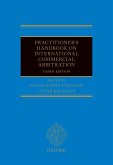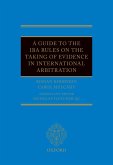This Handbook brings together many of the key scholars and leading practitioners in international arbitration, to present and examine cutting-edge knowledge in the field. Innovative in its breadth of coverage, chapter-topics range from the practicalities of how arbitration works, to big picture discussions of the actors involved and the values that underpin it. The book includes critical analysis of some of international arbitrations most controversial aspects, whilst providing a nuanced account overall that allows readers to draw their own informed conclusions. The book is divided into six parts, after an introduction discussing the formation of knowledge in the field. Part I provides an overview of the key legal notions needed to understand how international arbitration technically works, such as the relation between arbitration and law, the power of arbitral tribunals to make decisions, the appointment of arbitrators, and the role of public policy. Part II focuses on key actors in international arbitration, such as arbitrators, parties choosing arbitrators, and civil society. Part III examines the central values at stake in the field, including efficiency, legal certainty, and constitutional ideals. Part IV discusses intellectual paradigms structuring the thinking in and about international arbitration, such as the idea of autonomous transnational legal orders and conflicts of law. Part V presents the empirical evidence we currently have about the operations and effects of both commercial and investment arbitration. Finally, Part VI provides different disciplinary perspectives on international arbitration, including historical, sociological, literary, economic, and psychological accounts.
Dieser Download kann aus rechtlichen Gründen nur mit Rechnungsadresse in A, B, BG, CY, CZ, D, DK, EW, E, FIN, F, GR, HR, H, IRL, I, LT, L, LR, M, NL, PL, P, R, S, SLO, SK ausgeliefert werden.









